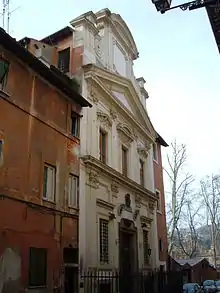Oratorio del Gonfalone, Rome
The Oratorio del Gonfalone or Oratory of the Banner is a building in Central Rome which once housed a Catholic fraternity.

Founded in 1264 under the name of the Accomandati di Madonna Santa Maria, over the centuries the group dedicated itself to various activities, including the participation in religious processions as banner carriers (wearing white gowns with peaked blue hoods), and also of putting on a yearly passion play. They also were involved in charity towards the poor and needy, and during 1581–1765, of freeing Italians enslaved in Muslim and Slavic lands. The fraternity was awarded the Golden Rose in 1526 by Clement VII, and given by Julius III in 1550 the prerogative to pardon one individual. In 1890, the fraternity was dissolved and its property confiscated by the state.
The building on Via del Gonfalone 32a (near corner of Via Giulia and Vicolo della Scimmia) has a modest façade (designed by Domenico Castelli) resembling a simple church. Inside, a team of prominent Mannerist painters were recruited between 1569–1576 to complete elaborate wall fresco decoration of scenes of the passion. Artists included Giacomo Zanguidi (il Bertoia) (Entry of Christ to Jerusalem); Livio Agresti (Last Supper); Marco Pino (Crown of Thorns), Marcantonio dal Forno; Federico Zuccari (Flagellation of Christ); Raffaellino Motta da Reggio (Christ before Pontius Pilate and Prophet and Sibyls); and Cesare Nebbia (Crown of Thorns and Ecce Homo). The main altarpiece is painted by Roviale Spagnolo. The site has been called the Sistine chapel of Mannerism. The Passion panels are flanked by quadratura spiral columns (said to have been of the type found in the Temple of Solomon) and surmounted by images of prophets and sybils. The restored frescoes are vivid in coloration.
The oratory's frescoes were restored in the recent decade, and the site is used for many of the concerts by the Coro Polifonico Romano.
Note there are at least two other Oratorio del Gonfalone in Italy, also highly decorated in the interior, one at Fabriano and the other at Vicenza.